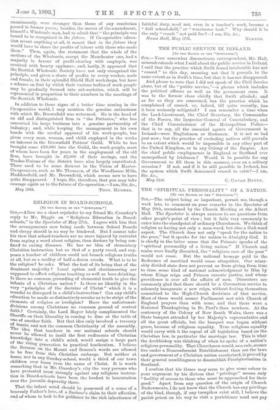RELIGION IN BOARD-SCHOOLS.
[To THE EDITOR OF THE " SPEOTATOR."] &n,—Allow me a short rejoinder to my friend Mr. Crosskey's reply to Mr. Diggle on "Religious Education in Board- .schools," in the Spectator of May 27th. I agree with him that the arrangements now being made between School Boards and clergy should in no way be hindered. But I eannot take his view that school-teachers are no more injured by restraint from saying a word about religion, than doctors by being con- fined to curing diseases. He has no idea of elementary Christian instruction but as that of a party creed, and sup- poses a teacher of children could not broach religious truths at all, but as a medley of half-a-dozen creeds. What is to be the religion P he asks. What the test of its being that of the dominant majority ? Local option and electioneering are supposed to affect religions teaching as well as beer-drinking. Is there no common grounding of elemental truth to give the infants of a Christian nation ? Is there no identity in the very "principles of the doctrine of Christ" which it is a scandal to disregard in a child's instruction? Can any child's education be made so distinctively secular as to be stript of the elements of religion or irreligion? Have the unfortunate divisions among Christians no common ground of central faith ? Certainly, the Lord Mayor lately complimented the Sheriffs on their liberality in coming to dine at the table of one of another faith. But that idea only involved a travesty 4:)f toasts, and not the common Christianity of the assembly. The id„ that teachers in our national schools should never be allowed to instil the first rudiments of Christian knowledge into a child's mind, would assign a large part of the rising generation to practical heathenism. I believe the Sermon on the Mount and Seneca's words are allowed to be free from this Christian embargo. But neither at home, nor in any Sunday-school, would a third of our town children ever learn even the name of Christ. It is worth remarking that in Mr. Crosskey's city the very persons who have protested most strongly against any religious instruc- tion in Board-schools have been the loudest in lamentation over the juvenile depravity there.
That the infant mind should be possessed of a sense of a heavenly Father's love, of a Saviour's claim to their affection, and of whom to look to for guidance to the rich inheritance of faithful duty, need not, even in a teacher's work, become a " dull school-drill," or "wearisome task." Why should it be the only " result " not paid for P—I am, Sir, &c.,






































 Previous page
Previous page